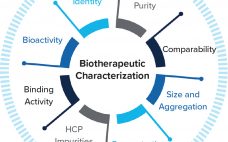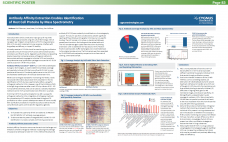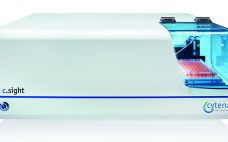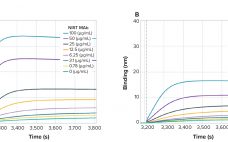Wacker Biotech is “The Microbial CMO” — the partner of choice for process development and contract manufacturing of biopharmaceuticals (proteins, vaccines, and live microbial products) using microbial hosts. WACKER’s integrated service portfolio covers molecular biology, process/analytical development, and good manufacturing practice (GMP) manufacturing of biologics for clinical and commercial supply. WACKER operates three state-of-the-art GMP facilities located in Europe (Germany and The Netherlands). Manufacturing lines with two 300-L and two 1,500-L stainless steel fermentation vessels, single-use fermentation lines, matching downstream…
Thursday, August 1, 2019 Daily Archives
Rapid Help for Cancer Patients: Fully Integrated Project Solution for Accelerated Supply of Valuable Active Agents to the Market
The development of a new, innovative drug is a highly complex and cost-intensive technical task. It normally takes more than 10 years from initial idea to first approval of a drug. As the statutory requirements for patient safety have become ever more stringent in recent years, development expenditure has increased significantly. High investment costs needed to develop some drug products are estimated to be 1–1.6 billion US dollars, which can be amortized only after market launch (1). The race against…
Process Effects on Drug Product Quality in Pharmaceutical Manufacturing: A Validated Measurement Process
Pharmaceutical manufacturing is an industry laden with many challenges and risks because of the life-changing nature of its products — drugs that can affect millions of human lives. Manufacturers perform immensely complex research and testing daily while facing economic challenges and regulatory requirements. This article covers the benefits of surface plasmon resonance (SPR) in the drug development pipeline and describes a recent validation guide specifically for the implementation of SPR technology in regulated workflows. Fill out the form below to…
Antibody Affinity Extraction Enables Identification of Host Cell Proteins by Mass Spectrometry
Host cell proteins (HCP) constitute a major group of impurities for biologic drugs produced using cell culture technology. Even at nanogram per milligram concentrations of HCP to drug substance (DS), HCPs can elicit undesired immune response, interfere with drug safety and efficacy, or impact DS stability. A broadly-reactive HCP ELISA should be used during the purification processes to ensure removal of HCPs and to demonstrate process consistency and final DS purity. Regulatory authorities are requesting biopharmaceutical companies employ orthogonal methods…
Challenging the vaccine space: The problem with pioneers
With GSK, Merck, Pfizer, and Sanofi dominating the vaccine space, “the only thing pioneers get are arrows in their back,” say a group of industry experts. At BioProcess International Europe in Vienna, Austria in April, Bioprocess Insider hosted a vaccine-focused roundtable. The panel brought together some of the world’s leading luminaries within the space to discuss some of the major challenges within the vaccine industry, from technology challenges to the online army of anti-vaxxers. The group also spoke about the…
Single-Cell Dispensing for Cell Line Development and Single-Cell Genomics: Most Trusted Technology for Assuring Monoclonality by the Pharmaceutical Industry
Clonal cell line development is a crucial step in a number of applications, including generating biopharmaceuticals (e.g., monoclonal antibodies, MAbs). Current workflows in cell line development have major drawbacks such as missing proof of clonality, inefficient single-cell isolation, and reduced cell viability. The single-cell printer™ technology offers documented assurance of clonality and provides efficient and fast single-cell seeding combined with excellent cell viability and zero risk of cross-contamination. All cytena products support SLAS/SBS format 96-well and 384-well plates. Different typical…
High-Throughput Sialylation Screening on an Octet Label-Free Instrument: Expediting Clone Selection in Cell Line Development
A high-throughput method for relative screening of terminal sialic acid content was developed on the Octet platform to expedite cell line development. The method is based on the use of ForteBio’s sialic acid (GlyS) kit to bind sialic acid on glycoproteins. The GlyS kit can screen specifically the sialylation levels of secreted proteins in crude cell culture samples and does not require purified samples. Using this method, 96 crude cell culture samples can be screened for sialylation in 60 minutes…
Gene Editing: A Step Change in Biopharmaceutical Manufacturing
The natural characteristics of Chinese hamster ovary (CHO) cells have contributed to their use as the dominant expression platform in biomanufacturing. To increase the capabilities of these host systems, fundamental improvements to the CHO cell line are needed, which is where we believe that gene editing can offer a step change in biopharmaceutical manufacturing. Fill out the form below to read the complete technology review now.
Bemoaning bottlenecks? Put a cork in it! Downstream techs better than ever
Innovative methods and techs have reshaped downstream operations says an industry expert. If you Google “biopharma” and “bottleneck” most results will be articles suggesting upstream technologies have improved faster than those downstream. But the idea of a “downstream bottleneck” is something of a misnomer says Tom Ransohoff from BDO. Instead he argues the upstream gains reflect where innovation efforts have focused. “When antibody and protein titers in mammalian cell culture systems were less 1 g/L several decades ago, the capacity…
Addressing Key Attributes of Viral Vectors
Adeno-associated viruses (AAVs) are the most commonly used type of viral vector applied in gene therapy trials to date (1). From a regulatory perspective, an understanding of the critical quality attributes (CQAs) that impact product safety, purity, and potency is required. Specific analytical assays to assess vector productivity, vector purity, biological activity, and safety are required to generate data to ensure that the vector is produced with the consistency necessary to ensure safety and prevent undesired affects (2) on patients’…










